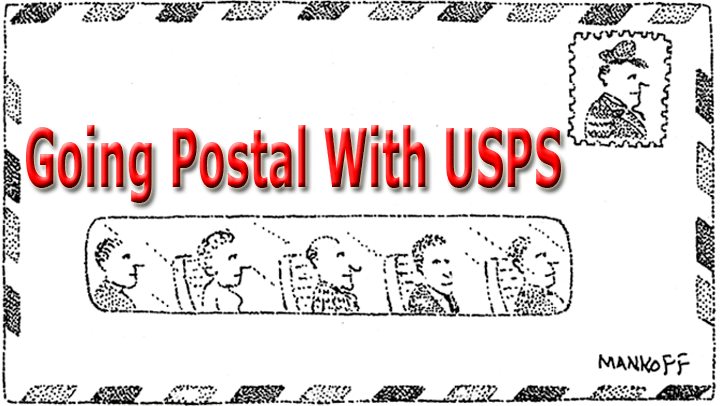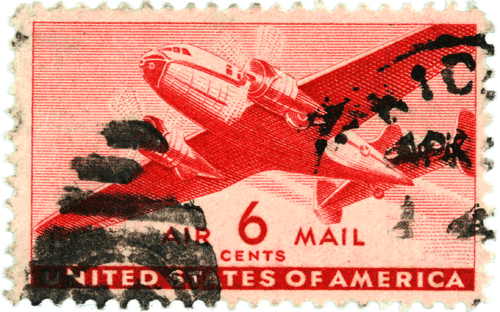
In
case you missed it because you were watching World Cup soccer, hanging
with the kids at the pool, or attempting to keep your business or job
afloat, last Friday July 11, 2014, was an important date—it marked
five years since the United States Postal Service (USPS) International
Air Mail Deregulation was first enacted.
But as far as we can tell, neither USPS
nor the airlines seem to have celebrated the anniversary.
Now that five years have passed, the question becomes whether anyone
is happy with the change.
We suppose it started out okay.
Five years ago in 2009, the U.S. government
implemented legislation (that was the result of a coordinated effort
between U.S. airlines and the Postal Service) to eliminate the U.S.
DOT's rate-setting authority, allowing USPS to negotiate contracts with
U.S. and foreign flag air carriers for its international mail transportation
rates and services.
USPS Wanted
A New Deal
Back in 2006, USPS published a white
paper pointing to the U.S. DOT’s regulation of air transportation
rates, noting that the requirement for Postal Service to use U.S.-flag
carriers “prevented the Postal Service from receiving best service
at the best price.”
Under the regulated system, the Postal
Service complained that, “allocating mail between participating
carriers rather than negotiating the terms and conditions of service”
allowed for “little incentive for the parties to find mutually
beneficial efficiencies.
“One result was that containerization
and streamlined handling techniques common in air cargo were generally
not used for international air mail,” USPS insisted.
USPS often and loudly complained that
carriers did not always meet service standards.
USPS also said that rates set by the DOT
were much higher than those it would pay in a competitive market.
In December 2008 USPS received the U.S.
government green light for legislation allowing the Postal Service to
seek other business partners, meaning other airlines and even foreign
flag carriers, to move international mail and five years ago on July
11, 2009 was the start of the first deregulated contract.
So, what is the result?
USPS Wants
A Do Over
Today sources say USPS seems to be acting as
if the deregulation result may have been the deal from hell—for
one thing, it has not included enough cost savings.
“USPS behaves in a manner consistent
with someone who got what they asked for, but are now unhappy with it,”
a source told FlyingTypers.
For example, we were recently informed
by a source that “in a Los Angeles meeting, USPS spent some portion
of that get together expressing concern about U.S. flag carrier domination
of the air mail business, even under the deregulation law.”
Most people in the airline business, whether
domestic or foreign, are absolutely unwilling to take on USPS publicly—hence
our myriad unnamed sources. The voices are many, but they remain in
the shadows out of fear.
To be fair, we contacted USPS to comment
on our story, but the agency did not reply.
So What’s Happening?
 To paraphrase Winston Churchill’s famous speech in Fulton, Missouri:
To paraphrase Winston Churchill’s famous speech in Fulton, Missouri:
“Today an iron curtain has fallen
over the USPS and its air mail dealings with its traditional partners
in the airline business.”
But unfortunately, the least helpful thing
in the current situation is a loss of transparency.
“Prior to Deregulation, there was
a lot more transparency at USPS,” FT
was told by a source.
“Now, five years later, a veil exists
when dealing with USPS.”
How did that happen, you ask?
If you’re wondering how that happened,
another source close to the situation had this to offer:
“The view amongst some in the business
is that USPS is stretching the deregulation limits to find cost savings.
“That could mean that while USPS
top management preaches one way of doing business, abiding by the new
deregulated environment—which includes the proviso to award mail
contracts to U.S. flags by preference to capacity and rates and other
criteria—USPS executives down the line may be cutting other deals.”
Another source stated flatly:
“The USPS is taking liberties with
the assignment of mail and has removed the transparency we used to have.
“Maybe,” it was suggested,
“USPS is not measuring its deregulation results against the DOT
regulated rates, which show significant cost improvement.
“USPS may be looking at freight
rates and thinking that their deregulated mail rates are still too high.”
We have learned that when the U.S. flags
were negotiating the deregulated international airmail law more than
half a decade ago, the carriers indicated to USPS that if the agency
wanted freight rates they could provide them, but USPS would have to
act like a forwarder in the negotiations.
So USPS needed to make some simple commitment
to volumes, one-on-one negotiations, and basically all the drivers that
allow line carriers to put a freight forwarder deal together.
Well, guess what?
Five years ago USPS rejected that arrangement
out of hand.
So now in 2014, operating with the government
mandate ratified with the U.S. flags, USPS has decided that they do
not like the deal.
USPS Loses
24/7
Obviously the 800-pound gorilla in all of this
is that USPS as a business is a colossal money loser and has been in
a sea of red ink for 19 of the past 21 consecutive quarters.
The U.S. Postal Service ended the first
quarter of the 2014 fiscal year (Oct. 1, 2013 – Dec. 31, 2013)
with a net loss of $354 million.
That loss follows USPS reporting a loss
of $5 billion last year.
It has gotten so bad that an incredible
$5 billion loss in 2013 was ballyhooed as some kind of good news as
compared to a loss in 2012 of an almost surreal 15.6 billion.
So where does all of this leave the airlines?
U.S. flags grew up relying on business
from USPS and have by and large over the years done a pretty good job
evolving and building global business for the agency.
But now carriers find themselves cut adrift,
as the USPS flails about, cutting deals that no one is willing to talk
about—or can prove—whilst campaigning U.S. lawmakers for
further deregulation legislation that would allow the agency to ride
roughshod over its U.S. flag partners.
Today the USPS business environment encourages
participation and that means even more airlines carrying the mail as
a way to reduce USPS cost.
But the sad truth underneath all of this
is that dealing with a USPS in the throes of much bigger problems has
become art of the unusual in what was once business as usual.
U.S. legislators need to quit the Band-Aid
approach and stop rolling over to even more USPS airmail demands. In
addition, some level focus needs to be applied about where the problems
of the US Postal Service really reside.
All of this complaining about rates between
the USPS and the airlines sounds a bit off key to us.
The hard-fought battle to deliver value
for money is a high priority for all the air carriers we have come into
contact with lately.
Geoffrey






